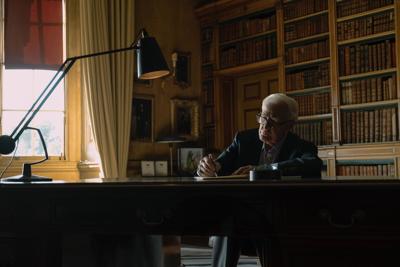He’s never been a tinker, tailor or soldier, but David Cornwell — better known to the world as internationally best-selling author John Le Carré — was, indeed, at one point a spy.
He was also a con man for a time, before flirting with a law career and then, after his stint in British intelligence, eventually becoming a novelist — all of which are, when you get down to it, a variation of the same theme.
That is to say: To be a good lawyer, to be a good novelist, to be a good spy, you must also be a good con man, a good storyteller and a persuasive liar.
Aided by an abundance of intellect and British charm, Cornwell was all of those things, and the author of "Tinker, Tailor, Soldier, Spy," "The Spy Who Came in From the Cold," "The Looking Glass War" and many other serial thrillers and other novels.
The mere idea of sitting him down to share his undeniably fascinating life story — as Errol Morris does in his riveting new film, “The Pigeon Tunnel” — would get almost any documentarian drooling.
Morris, however, isn’t just any documentarian. He is an envelope-pushing visionary who, like Cornwell, is considered among the greatest ever at his craft.
Dream matchup
On paper, the pairing of the two — Morris vs. Cornwell — sounds irresistible.
In reality, it is even better.
On the one hand, we have a filmmaking legend whose life’s work has revolved around such things as truth, authenticity and reality. On the other, we have a former spy and fiction writer whose life has been defined by betrayal, duplicity and manufactured facts.
Oil, meet water. Water, oil.
The result is ceaselessly captivating. Morris’ stylishly shot “Pigeon Tunnel” isn’t just one of the best documentaries of the year. It is a storytelling masterpiece.
Based on Cornwell’s 2016 memoir and culled from four days of interviews between the two men a year before Cornwell’s 2020 death, it is first and foremost a biographical portrait of a remarkably full life.
Deliciously literary
It is, of course, helped by Cornwell’s innate storytelling skills. Even in conversation, he is deliciously literary. At one moment, for example, he describes a joyful moment as “voluptuous.”
Who but a writer?
As he shares the details of his life, Cornwell’s dry wit is abetted by his erudite manner of speaking and the occasional flash of mischief across his face. But even when rehashing the more difficult chapters — and there are many — he insists he is not complaining, that he has no axes to grind or grievances to air.
He probably should, though.
As we learn, his mother walked out on his family when he was a young boy. That left him to be raised by his father, a professional grifter addicted to the art of the ruse.
That led to the occasional prison term for the old man, although as Cornwell describes it, his father wasn’t so much afraid of the law as he was afraid of the mob.
That sort of underworld upbringing, in which moral ambiguity is a daily fact of life, is bound to leave an indelible mark on a child. Rather than scarring him, however, it laid the groundwork for Cornwell’s career as a spy and storyteller.
Deceit and playacting
For him, deceit and playacting were simply part of the family business, and he was a quick learner.
“Reality did not exist in my childhood,” Cornwell said. “Performance did.”
He’s got so many compelling stories, and he tells them so well, that there had to be a temptation to simply roll film, cue Cornwell and let him talk.
Morris, however, dives deeper. Before long, one starts to think the old spy might not be the most reliable of narrators, even of his own story.
Consequently, his motives and memories are fair game for questioning by Morris.
So he questions them, sparring amiably with Cornwell in his unique interrogative style about such things as reality vs. invention, about truth vs. fiction and, perhaps most central to it all, about betrayal, which was equally as frequent a theme in Cornwell’s life as in his spy-vs.-spy novels.
Between that compelling throughline, and his film’s sterling technical aspects, Morris casts such a spell, sets such a scene, that “The Pigeon Tunnel” pushes beyond engaging or immersive to become something closer to spellbinding.
Even voluptuous, one might say.
Mike Scott can be reached at moviegoermike@gmail.com.
Oh, if only Jerry Lewis were still with us today.
In 2010, Ben Affleck burnished his filmmaking cred with the critically acclaimed bank-robbery thriller “The Town,” a film as notable for its t…
In the most literal sense, you’ll have to look hard to spot New Orleans in the locally shot adaptation of the Stephen King horror yarn “The Bo…




